STATEHOUSE REPORT | ISSUE 21.41 | OCT. 14, 2022
BIG STORY: South Carolina is 6th least politically engaged state, study says
NEWS BRIEFS: Evette, Casey discuss abortion, education in statewide debate
LOWCOUNTRY, Ariail: Spokeschicken
COMMENTARY, Brack: Optimism seems to be springing forth
SPOTLIGHT: The S.C. Education Association
ANOTHER VIEW, Saul: Let’s not perpetuate racial inequities
FEEDBACK: Send us your thoughts
MYSTERY PHOTO: Old brick building
South Carolina is 6th least politically engaged state, study says
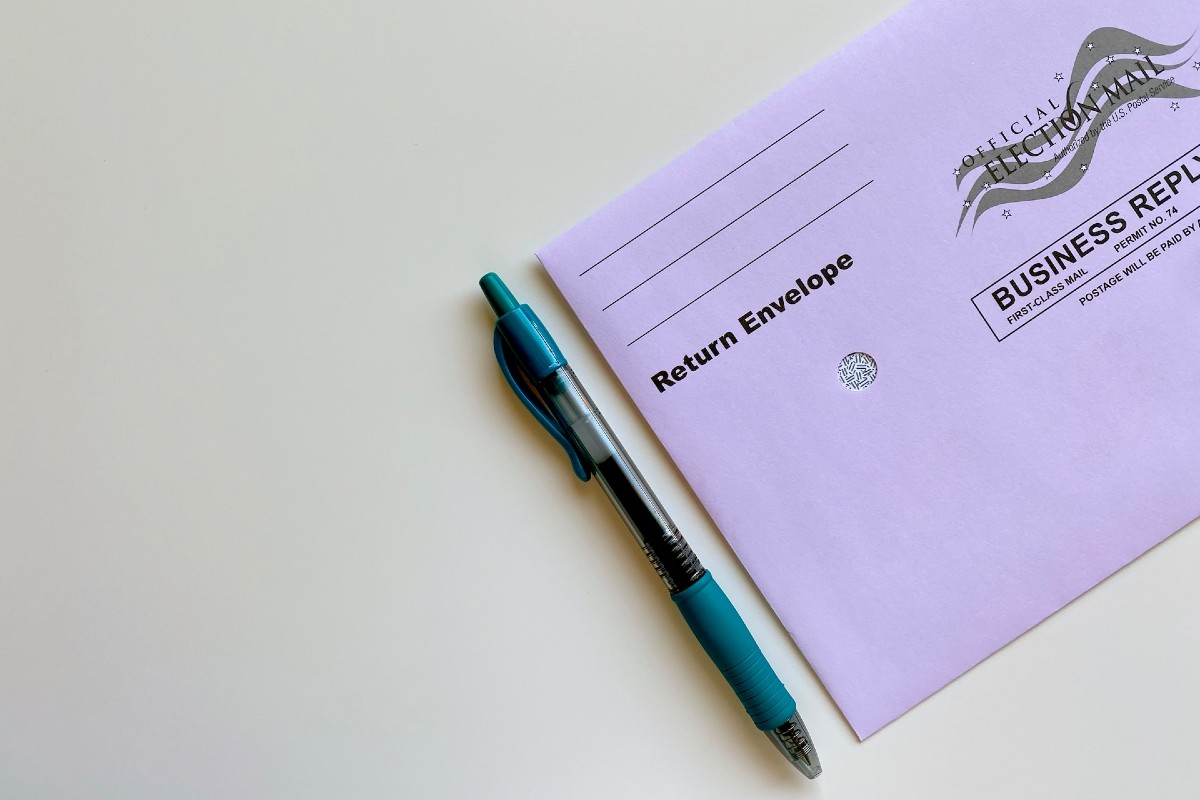
Staff reports | South Carolina was the nation’s sixth least politically engaged state in 2022, according to a new study.
To determine the level of political engagement in each state, WalletHub utilized 10 key metrics, grading each metric on a 100-point scale, with a score of 100 representing the most political engagement.
The Palmetto State ranked 45th out of the 50 states in political engagement, scoring a 31.55 out of 100 in the new WalletHub study. Among the findings of the study on South Carolina’s overall political engagement:
- 44th in total political contributions per adult population.
- 43rd for the percentage of the electorate that voted in the 2018 midterm elections.
- 40th for the percentage of the electorate that voted in the 2020 presidential election.
- 39th for the change in percentage of the electorate that voted in the 2020 elections versus the 2016 elections.
- 34th for the percentage of registered voters in the 2020 presidential election.
- 34th in voter accessibility policies.
States that ranked below South Carolina were Nebraska (31.10), South Dakota (30.76), Alabama (30.23), West Virginia (27.34) and Arkansas, the least politically engaged state in the nation with a score of 15.55.
The most politically engaged state was Maryland, with a score of 71.85. Second to Maryland was New Jersey (71.80).Rounding out the top five most politically engaged states were Virginia (69.41), Washington (68.82) and Oregon (68.43).
Better ranking on younger voters
The study also found that people between the ages of 18 to 24 in South Carolina ranked 17th best out of 50 states with a young citizen voter percentage of 53.40%. On the flip side, the percentage of citizen voters among the elderly (aged 65 and older) in South Carolina was 72.40%, a rank of 37 out of 50.
Daniel Aldrich, professor and director of the security and resilience studies program at Northeastern University, offered some strategies to potentially increase political engagement.
“To encourage people to vote, there are several things authorities can do,” Aldrich told WalletHub, “First, make election days national holidays so that people don’t have to choose between paying bills and civic engagement. Second, drop voter ID laws and follow the example of states like Massachusetts which make it easier to participate
“Third, provide transportation to polling stations from high-density areas And fourth, encourage more young people and minorities to run for office so that voters will feel their interests are being represented in political institutions.”
- Have a comment? Send to: feedback@statehousereport.com.
Evette, Casey discuss abortion, education in statewide debate
![]() Staff reports | GOP Lt. Gov. Pamela Evette debated Democratic rival Tally Parham Casey on Tuesday during a debate televised statewide. Among the topics: abortion, health care and education.
Staff reports | GOP Lt. Gov. Pamela Evette debated Democratic rival Tally Parham Casey on Tuesday during a debate televised statewide. Among the topics: abortion, health care and education.
Evette, an Upstate businesswoman before taking her current job, said she wants four more years so she and Gov. Henry McMaster can continue good works.
“We’ve made South Carolina better for our children and our children’s children,” said Evette, the state’s first female lieutenant governor.
Casey, who is an attorney and served as the S.C. Air National Guard’s first female fighter pilot, pushed the message that she and Democratic gubernatorial candidate Joe Cunningham are sharing: “Joe Cunningham and I want you to have more freedoms, not less,” she said.
- Click here to see five debate takeaways from The State newspaper.
CITY PAPER OPINION: Cunningham endorsed to be next governor.
“What we like about former Congressman Joe Cunningham’s race to unseat a longtime Republican incumbent is how the Charleston resident focuses on South Carolina issues, not the mess that goes on in Washington. While the incumbent fills the airwaves with garbage about Washington, it’s important to remember that South Carolina leaders, not those in Washington, are the ones who steer our state’s economy and educate our children. … Blaming Washington for everything is cheap theater that distracts voters from what’s what.”
In other headlines:
New S.C. House committee meets to discuss state’s economic success. The bipartisan 12-member House panel met to discuss how to maintain the state’s economic success for the long-term future, as well as expanding access to cheap and reliable power.
McMaster signs electric vehicle executive order. S.C. Gov. Henry McMaster signed an executive order Thursday that will focus on efforts to recruit electric vehicle-related businesses to South Carolina.
Pence to speak at Wofford College. Former Vice President Mike Pence is scheduled to speak at Wofford College in Spartanburg ahead of the 2022 midterm elections.
Mace, Cunningham discuss mairjuana on campaign trail. Decriminalization of marijuana has become a bipartisan issue in South Carolina. U.S. Rep. Nancy Mace, R-S.C., this week said President Joe Biden’s pardoning of simple possession of marijuana is a step in the right direction, but more needs to be done. Her recently proposed bill will help more people, she said. Meanwhile the guy who once held her job but now is running for governor, Democratic candidate Joe Cunningham, called the incumbent governor an obstructionist to getting medical and recreational marijuana legalized in South Carolina
U.S. Supreme Court rejects killer Roof’s appeal. The U.S. Supreme Court has rejected an appeal by mass murderer Dylann Roof who challenged his death sentence and conviction of racist slayings in 2015 of nine people at Emanuel AME Church in Charleston.
COVID update: 3,122 new cases, 4 deaths. South Carolina had 869 fewer cases of Covid-19 between Oct. 2-8 than the previous reporting period (Sept.25-Oct. 1), state officials reported Oct. 11. Four people died from the virus between Oct. 2-8.
Sunday brings 10 shooting deaths in three S.C. counties. Five people in Inman are dead after a Sunday night shooting, according to authorities. Five others died in apparently related cases in Horry and Richland counties on Sunday, according to published reports. A man is in custody in those cases.
Spokeschicken
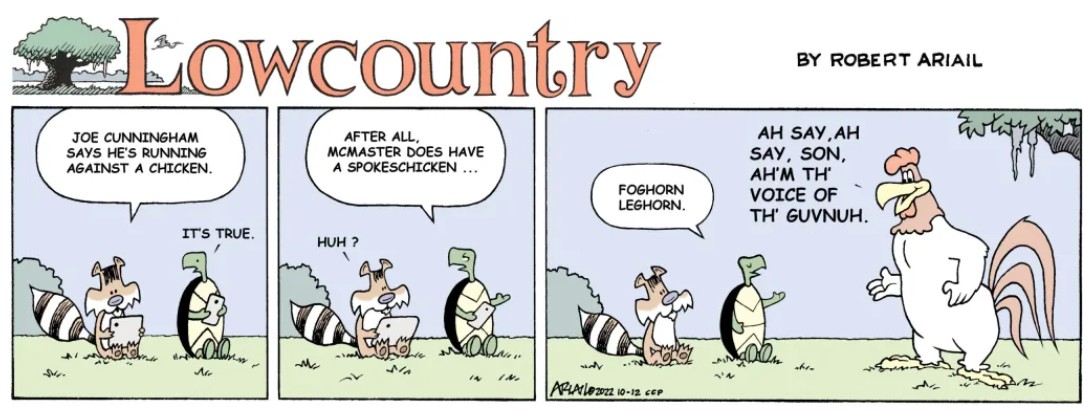
Cartoonist Robert Ariail often interprets things a little differently, but always has an interesting take on what’s going on in South Carolina. Love the cartoon? Hate it? What do you think: feedback@statehousereport.com.
Optimism seems to be springing forth
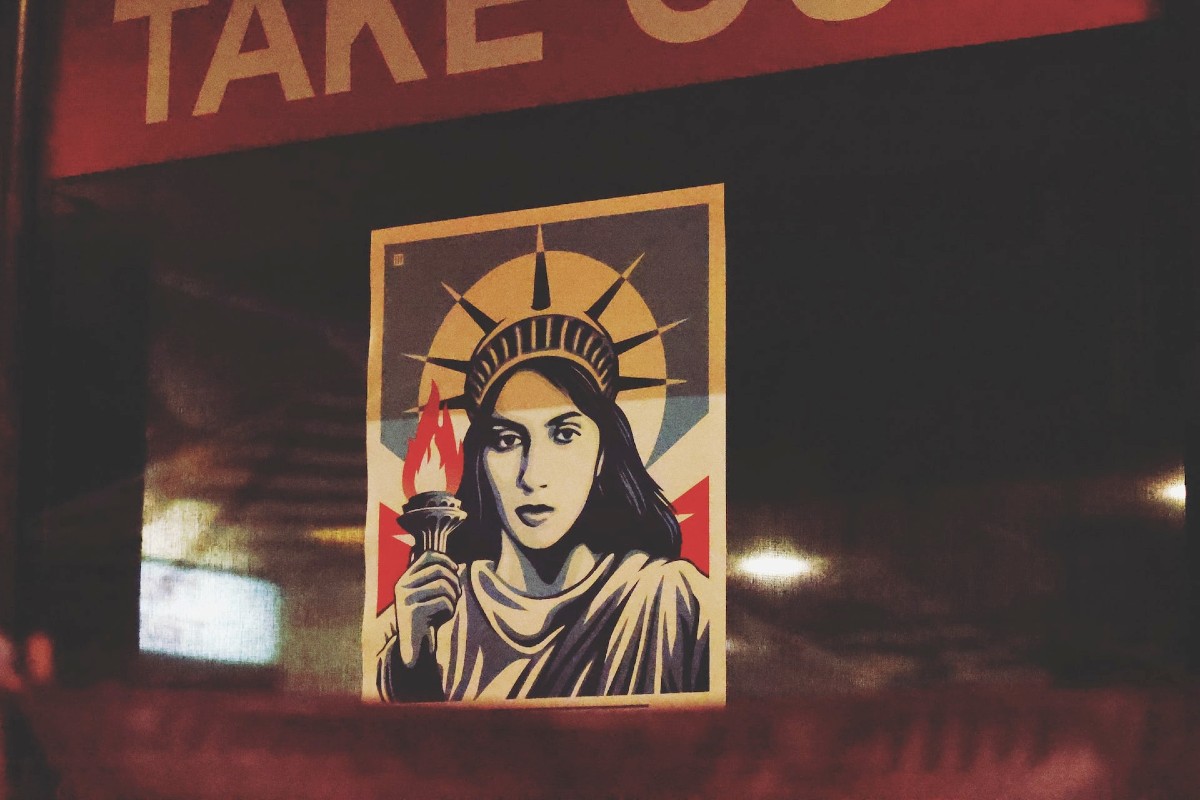
By Andy Brack | A funny thing happened on the way to the midterm elections: optimism about America’s democracy seems to be budding after months of trouble, toil and turmoil stemming from political tribalism, an attempted insurrection and a former president who can’t stop stirring the pot.
 Noted Charleston civil rights lawyer Armand Derfner, who last year co-wrote a book on the U.S. Supreme Court’s long dance with race and civil rights, beamed with optimism during a bookstore discussion this week. There will be pressures put on institutions like the court, viewed as widely out of step with American sentiment on abortion after it overturned Roe v. wade, to fall back in step with democratic principles. For the court, this may take time. But in the meantime, he said other institutions – the presidency, Congress, state legislatures, governors and more – are stepping up to right the ship of state.
Noted Charleston civil rights lawyer Armand Derfner, who last year co-wrote a book on the U.S. Supreme Court’s long dance with race and civil rights, beamed with optimism during a bookstore discussion this week. There will be pressures put on institutions like the court, viewed as widely out of step with American sentiment on abortion after it overturned Roe v. wade, to fall back in step with democratic principles. For the court, this may take time. But in the meantime, he said other institutions – the presidency, Congress, state legislatures, governors and more – are stepping up to right the ship of state.
“There will be pressure to do better things more in keeping with our traditions. … Many states will be better than they have been,” Derfner said, pointing to how conservative Kansasans voted to protect abortion over the summer.
Derfner isn’t alone with his optimism during a time that seems to be an inflection point in our country that’s similar to our history during and after the Civil War.
Longtime state Rep. Gilda Cobb Hunter, D-Orangeburg, says young people are waking up to the need for more civic engagement.
“While this does not apply to all young people, enough of them recognize the mess that we have made of things, especially the environment and intolerance of differences and that they are indeed the change they want to see,” she said.

Lexington native John Simpkins, a former constitutional law professor who runs a regional nonprofit, echoed her comments: “I’ve heard them [young people] express an ease with diversity, a curiosity about the world, and a tolerance for difference, even across political ideology. Young people understand that we are all together in this continuous project of nation-making. If adults would get out of their way, we just might learn a few things from them.”
ACLU of South Carolina Executive Director Jace Woodrum added, “What gives me hope is seeing South Carolinians fighting back for our freedoms. They’re signing up to be poll monitors to ensure no one is denied the right to vote. They’re coming to the Statehouse to oppose state legislators’ attempts to ban abortion. They’re speaking out against efforts to censor classrooms and ban books. It’s impossible not to feel optimistic when you’re arm-in-arm with your neighbors to protect the freedoms all Americans hold dear.”
The U.S. Constitution also has largely worked for more than 200 years, Furman University political science professor Danielle Vinson noted.
“While some talk about violence, I think the majority of the country is not inclined to turn to violence in our current division,” she said, adding that there are people in government today who are committed to peaceful transitions of power – even when elections may not go their way.
Sue Berkowitz of the S.C. Appleseed Legal Justice Center says she’s optimistic, too, and hopes younger American adults understand they can’t take voting for granted.
“They are speaking up for their own rights, and recognizing we all have an obligation to look after the rights of everyone and not sitting back as they hear racist and misogynist rhetoric,” she said.
State Democratic Party chairman Trav Robertson said people should remember the United States is a relatively young country – and experiment.
“We are going to make mistakes, but the one fact about our democracy — the one belief we must have – is while we make mistakes, Americans will always fix them.”
A seasoned state administrator who has witnessed the inner-workings of state government for more than 30 years also threw this into the mix – one of the nation’s greatest inventions was the system of checks and balances.
“I’ve certainly seen it work at the state level as relative power ebbs and flows along with the personalities in leadership at given points in time,” he said. “My biggest fear right now is that these processes take time, sometimes lots of time. The rapid nature of our discourse now has a tendency to overwhelm and eat away at the time it takes for the system of checks and balances to work.”
Not so optimistic
Not everyone is optimistic about what’s happening in politics today. Kevin Gray, S.C. campaign manager for the Rev. Jesse Jackson’s 1988 presidential campaign, isn’t as optimistic about what’s happening with American democracy.
“Maybe my feelings will change in my lifetime if we see a real expansion of democracy,” said Gray, now a Columbia restaurateur. “But when you have a two-party system, two poles in which many ‘tribes’ are forced to choose one or the other or a winner-take-all system where the goal is power either party or personal, then the system will continue to erode. I’ve always felt that the expansion of democracy means a real multi-party system and coalition government.”
Louis Jacobson, senior correspondent in Washington for The Poynter Institute’s PolitiFact, says he’s not too optimistic either.
“People are too insulated in their own bubbles, and social media encourages people not to see others as people,” he said. “It’s easier to attack someone online than to say something equivalent to their face, so that guardrail is largely nonexistent today.
“The best I can come up with is the possibility that our perception of all this anger is tilted by the squeaky-wheel phenomenon – people who are angry are a lot more likely to speak up than those who are copacetic.”
Be a part of righting the direction of the country. Vote on Nov. 8.
Andy Brack is editor and publisher of Statehouse Report and the Charleston City Paper. Have a comment? Send to: feedback@statehousereport.com.
The S.C. Education Association
The public spiritedness of our underwriters allows us to bring Statehouse Report to you at no cost. This week’s spotlighted underwriter is The South Carolina Education Association(The SCEA), the professional association for educators in South Carolina. Educators from pre-K to 12th grade comprise The SCEA. The SCEA is the leading advocate for educational change in South Carolina. Educators in South Carolina look to The SCEA for assistance in every aspect of their professional life. From career planning as a student to retirement assessment as a career teacher, The SCEA offers assistance, guidance, and inspiration for educators.
- Learn more: TheSCEA.org
Let’s not perpetuate racial inequities

By Dr. Bob Saul | I recently heard a campaign ad by U.S. Sen. Tim Scott, R-S.C., seeking reelection. In the ad, he strives to emphasize that no racism exists and that all we need to do is to embrace each other and move forward.
 To accentuate his point, he notes that his grandfather grew up in the segregated South and that he quit school in the third grade to pick cotton and generate income for the family. And that his grandfather held no ill thoughts for his lot in life and taught Tim to love one another. It took me several times to unpack this ad before I realized that Scott is, by and large, oblivious to the message that he touts.
To accentuate his point, he notes that his grandfather grew up in the segregated South and that he quit school in the third grade to pick cotton and generate income for the family. And that his grandfather held no ill thoughts for his lot in life and taught Tim to love one another. It took me several times to unpack this ad before I realized that Scott is, by and large, oblivious to the message that he touts.
Love for each other is critical to rebuild our society that has been torn at the seams with discord, lies and destructive behaviors that have eroded trust. So, this part of the message is to be embraced. But does he realize what he just said?
- Only one generation away, he notes that his grandfather grew up in a society that purposely subjugated and suppressed the hopes and dreams of fellow humans based on the color of their skin.
- He notes that his family’s financial well-being was so crushed that his grandfather had to quit school in the third grade to make money for the family.
- He notes that his grandfather was engaged in child labor under the probable control of some not-so-benevolent cotton farmer. Even if it was a family farm, it is still child labor.
- He notes that his grandfather had to relinquish his chance at educational growth due to the circumstances in our society, circumstances that were out of his control and circumstances that were “designed” to perpetuate this cycle. Just because one grandson rose to become a U.S. senator doesn’t justify the continuance of such a system.
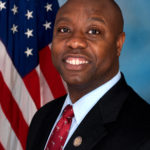
Racism is a problem for all, but particularly children, Tim Scott’s grandfather in particular. The childhood experiences of racism are recognized to occur at three levels— institutional, personal, and internalized.
Institutional (or structural) racism refers to the social structures that continue the disadvantages for some and the advantages for others and perpetuate the system that allows it. These social structures can include neighborhoods, educational sites, pockets of poverty and legal means. When these institutional factors occur, they are real barriers. And when these barriers are present, these experiences become very personal. And then more often than not, these personal experiences become internalized by the folks living under the specter of racism, Tim Scott’s grandfather in particular.
Ibram Kendi, history professor at American University, tells us that it is not sufficient to say “I am not a racist.” Such a passive stance goes against our moral and religious teaching. We have to be active in our stance against racism, bigotry and institutional barriers that perpetuate keeping one group of citizens at a continued disadvantage. We have to be anti-racist—that is, we have to be “one who is supporting an anti-racist policy through their actions and expressing anti-racist ideas.” We have to be on the front lines opposing racism at every turn.
Racism has existed and still exists when one considers the multiple measures (lower mean family incomes, lower financial value of housing, decreased educational attainment, decreased generational wealth, increased percentage of incarceration and so many others) that still demonstrate how the past (“the segregated South”) has not been erased and cries out for change.
The past and present cry out for concerted efforts to address racism and seek solutions that can move us all forward. Senator Scott’s whitewashing of the past and the uncomfortable present only serves to ignore the issues and to perpetuate the inequities.
Retired pediatrician Robert A. Saul lives in Greenwood. Have a comment? Send to: feedback@statehousereport.com.
Spouting like other political hacks
To the editor:
![]() Responding to Andy Brack’s comments on the Jan. 6, 2021 incident at the Capitol.
Responding to Andy Brack’s comments on the Jan. 6, 2021 incident at the Capitol.
Have you ever stopped to ask yourself, just why did so many people object to the results of the 2020 election of Mr. [President Joe] Biden? The ‘people’ you refer to as seditionists knew that the election was stolen and wanted Washington to know how fed up they were. Granted, they should not have stormed the Capitol building, but it has also been shown through the Epoch Times expose that there were leftist people in the crowd that were deliberately inciting the protestors….
Maybe you should get your facts straight next time, and not just spout off like all the other political hacks out there. I’m just so sick and tired of all the lying that continues to spew from the pens of people like you.
– Bill Nowell, Seneca, S.C.
Editor’s note: Biden outpolled Trump by millions of votes. The election was not stolen as supported by many news and state investigations since November 2020. Example: “An Associated Press review of every potential case of voter fraud in the six battleground states disputed by former President Donald Trump has found fewer than 475 — a number that would have made no difference in the 2020 presidential election.” Additionally, the Epoch Times is not considered a reliable source.
- Have a comment? Send your letters or comments to: feedback@statehousereport.com. Make sure to provide your contact details (name, hometown and phone number for verification. Letters are limited to 150 words.
Old brick building
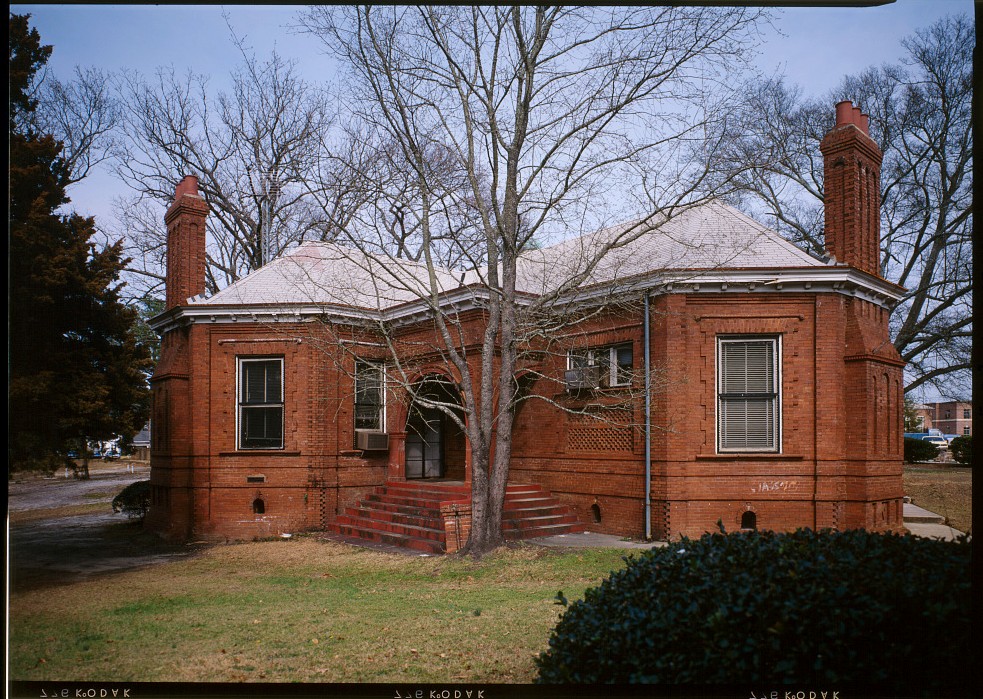
Here’s a really old color picture of a building somewhere in South Carolina that may or may not still exist. Where is it? Send your guess – and your name and hometown – to feedback@statehousereport.com.
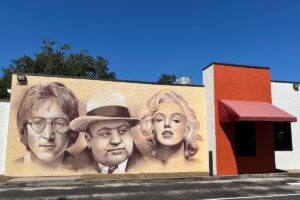 Last week’s image of “Triumvirate,” showed an odd mural of John Lennon, Al Capone and Marilyn Monroe on the side of a Moe’s fast food Mexican restaurant in Mount Pleasant.
Last week’s image of “Triumvirate,” showed an odd mural of John Lennon, Al Capone and Marilyn Monroe on the side of a Moe’s fast food Mexican restaurant in Mount Pleasant.
The photo so intrigued David M. Taylor of Darlington that he started digging into what it was:
“This mural … caused a little bit of a standoff with the city zoning board on what exactly constitutes ‘art’ or a ‘sign.’ It was created by Portuguese street artist Sergio Odeith. What I wanted to know is why these three were chosen for the mural. Other than their celebrity status I could not fathom a connection. But after reading this article I have at least an idea: “Prause [Mount Pleasant Zoning Administrator Kent Prause] argued the famous three figures portrayed in the mural — John Lennon, Al Capone and Marilyn Monroe — were connected to the restaurant brand, because Moe’s is an acronym for ‘musicians, outlaws and entertainers.’ But I never found anything from the owner or artist as to what the inspiration was for the choice.”
Great work, David. Hats off also to others who identified the mural: Jay Altman and Elizabeth Jones of Columbia; George Graf of Palmyra, Va.; Allan Peele of San Antonio, Texas; Jacie Godfrey of Florence; Pat Keadle of Wagener; David Lupo of Mount Pleasant; Lisa Griffin of Tega Cay and Bill Segars, as well as two others who didn’t identify the town. (You gotta send your town to get credit.)
>> Send us a mystery picture. If you have a photo that you believe will stump readers, send it along (but make sure to tell us what it is because it may stump us too!) Send to: feedback@statehousereport.com and mark it as a photo submission. Thanks.
- ORDER NOW: Copies are in Lowcountry-area bookstores now, but if you can’t swing by, you can order a copy online today.
- Now available as an e-book!
ABOUT STATEHOUSE REPORT
Statehouse Report, founded in 2001 as a weekly legislative forecast that informs readers about what is going to happen in South Carolina politics and policy, is provided to you at no charge every Friday.
- Editor and publisher: Andy Brack, 843.670.3996
Donate today
We’re proud to offer Statehouse Report for free. For more than a dozen years, we’ve been the go-to place for insightful independent policy and political news and views in the Palmetto State. And we love it as much as you do.
But now, we can use your help. If you’ve been thinking of contributing to Statehouse Report over the years, now would be a great time to contribute as we deal with the crisis. In advance, thank you.
Buy the book
Now you can get a copy of editor and publisher Andy Brack’s We Can Do Better, South Carolina! ($14.99) as a paperback or as a Kindle book ($7.99). . The book of essays offers incisive commentaries by editor and publisher Andy Brack on the American South, the common good, vexing problems for the Palmetto State and interesting South Carolina leaders.
More
- Mailing address: Send inquiries by mail to: P.O. Box 21942, Charleston, SC 29413
- Subscriptions are free: Click to subscribe.
- We hope you’ll keep receiving the great news and information from Statehouse Report, but if you need to unsubscribe, go to the bottom of the weekly email issue and follow the instructions.
- Read our sister publication: Charleston City Paper (every Wednesday in print; Every day online)
- © 2022, Statehouse Report, a publication of City Paper Publishing, LLC. All rights reserved.
















 We Can Do Better, South Carolina!
We Can Do Better, South Carolina!